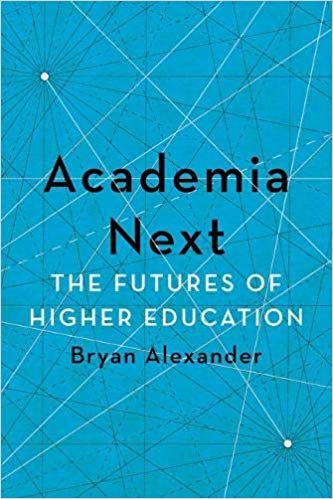You have /5 articles left.
Sign up for a free account or log in.
 Academia Next: The Futures of Higher Education by Bryan Alexander
Academia Next: The Futures of Higher Education by Bryan Alexander
Published in January 2020
Those who worry about the future of higher ed -- and who among us is without worry? -- would do well to put Academia Next on their reading list. It’s not that this book provides those of us in higher education much comfort in considering our possible futures. Instead, Academia Next provides academic readers with a set of tools from which to construct a set of scenarios, underpinned by trends, about the future of our schools and of our ecosystem.
Before we say much more about Academia Next, we should say some things about the ways in which the two of us are connected with the book’s author.
Alexander teaches in the learning, design and technology master’s program at Georgetown University, where one of us (Eddie) is the founding director. It would not be unreasonable for anyone reading this piece to see it as a bit of bragging about one of our star faculty members. It is precisely that.
Academia Next also shares the same publisher and editor as our book, Learning Innovation and the Future of Higher Education. And indeed, Alexander features somewhat prominently in our book as an example of an independent scholar doing important work at the intersection of organizational change, technology and learning.
Bragging (rights) aside, our connections with Alexander say less about our relationship with him and more about just how small our higher ed community really is. If there is an emerging interdisciplinary field of learning innovation, as we argue in our book, then Bryan Alexander is a card-carrying member.
Academia Next can be read in two ways. The first is as a look ahead to the next 15 years of higher education, grounded in seven possible scenarios, each developed through an initial deep dive into over 100 trends impacting the postsecondary ecosystem.
A second way to read Academia Next is as a master class into how a futurist goes about their craft. These two ways of reading Academia Next are of course related, and indeed inseparable, as the utility of Alexander’s scenario construction about the future of higher education rests on the validity of his methods.
The first half of Academia Next takes on a deep dive into trends as diverse as demographic shifts (fewer kids), stratification (more of it), policy shifts (public disinvestment), technological advances (VR, gamification, analytics, etc.), faculty labor markets (adjunctification) and many more. The six chapters devoted to unpacking and analyzing the trends both within and outside higher ed are useful in both grounding the scenarios in the second half of Academia Next, and of demonstrating what higher ed futurism is not.
As we learn in Academia Next, a higher ed futurist (at least a good one) does not content themselves with extending past trends to future dates. Instead, the futurist builds scenarios that both integrate what has come before with inflection points that have yet to arrive. Perhaps even more so, the futurist recognizes the truth in Gibson’s oft-quoted maxim that “the future is already here -- it's just not evenly distributed.”
The seven scenarios that Alexander builds in Academia Next are the true heart -- and delight -- of the book. Readers well versed in the trends discussed in the first half of the book can be forgiven for a bit of impatience in getting to the scenarios. It is impossible to begrudge Alexander for rigorously following the methodology of building imaginative and scenarios on thoroughly grounded expositions of trends. The scenarios, while wildly divergent from one another, are plausible and persuasive precisely because they are built upon the sturdy foundation.
Each reader of Academia Next will have their preferred scenario for our world between now and 2035. Or perhaps, they may prefer combinations, such as an amalgamation of a higher ed Renaissance (Ch. 10), with elements of the augmented campus (Ch. 11). Should open education gain widespread traction (“Open Education Triumphant,” Ch. 9), or institutions decide to market themselves as tech-free havens (“Retro Campus,” Ch. 13), then Academia Next will deserve credit for bringing into sharp focus what has previously been dimly perceived.
The various nodes of Alexander’s network -- from his consulting clients to readers of his blog to participants in his Future Trends Forum to subscribers to his Future Trends in Technology and Education monthly report -- will of course be among the first to order Academia Next. The book deserves to be read and debated beyond those already familiar with Alexander and his work. Every college and university should be the author of its own destiny, rejecting the choice to follow the path laid down by other institutions or feel themselves at the mercy of exogenous trends. Academia Next will help president and professors, trustees and technologists, provosts and part-time faculty construct their futures.
Whether or not you place Academia Next within our own imagined interdisciplinary field of learning innovation -- or you claim the book for your own discipline -- the book is certain to catalyze an informed and energetic conversation about the future of higher ed.
What are you reading?




